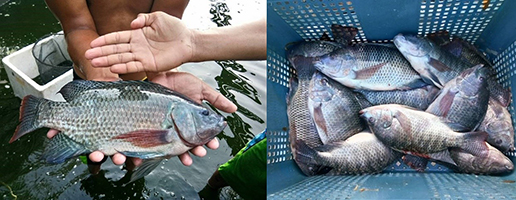 Did you know that high-blood glucose level or diabetes also occurs in fishes?
Did you know that high-blood glucose level or diabetes also occurs in fishes?
Aquatic organisms are considered diabetic as they cannot utilize dietary carbohydrates. This condition depends on the fish’s food consumption.
Carnivorous fishes, which are meat-eaters and generally require live foods, are on top of the list of diabetics.
Nile tilapia, which is considered omnivorous and moderately able to cope with high dietary carbohydrates, is found to benefit from low dosage (0.02%) of benfotiamine, a human food supplement similar to Vitamine B1 or thiamine. Omnivorous animals eat a variety of both meat and vegetable matter.
With this information, the University of the Philippines Visayas-National Institute of Molecular Biology and Biotechnology (UPV-Biotech) conducted a pilot feeding trial wherein the project team supplemented benfotiamine in the tilapia’s diet. The trial yielded higher gross income, profit, and profit margin compared with either commercial or high-carbohydrate diet.
The results of the trial were reported by Dr. Augusto E. Serrano, Jr., Professor 12 and Director of UPV-Biotech during the online project monitoring and evaluation organized by the funding agency, the Philippine Council for Agriculture, Aquatic and Natural Resources Research and Development of the Department of Science and Technology (DOST-PCAARRD).
Benfotiamine to accelerate fish growth
Benfotiamine is similar to Vitamin B1 or thiamine, in structure but is considered more available and better absorbed by the body than thiamine.
Supplementing benfotiamine in the diet of tilapia can accelerate fish growth due to increased utilization of carbohydrates by 40% and above.
Dietary carbohydrates are the cheapest components in aquafeeds. However, the use of dietary carbohydrates should be limited as it has a negative effect on fish body growth.
Blood glucose of the Nile tilapia supplemented with benfotiamine was able to lower glucose level five hours after feeding. Moreover, the diet supplemented with benfotiamine showed 26% profit margin over high carbohydrate feed and 48% profit margin over commercial feed diet.
Tilapia fed with diet containing benfotiamine was found to be superior in terms of body weight and growth response. The metabolic-digestive organs of tilapia supplemented with benfotiamine functioned more efficiently as their genes involved in breaking down carbohydrate were upregulated.
